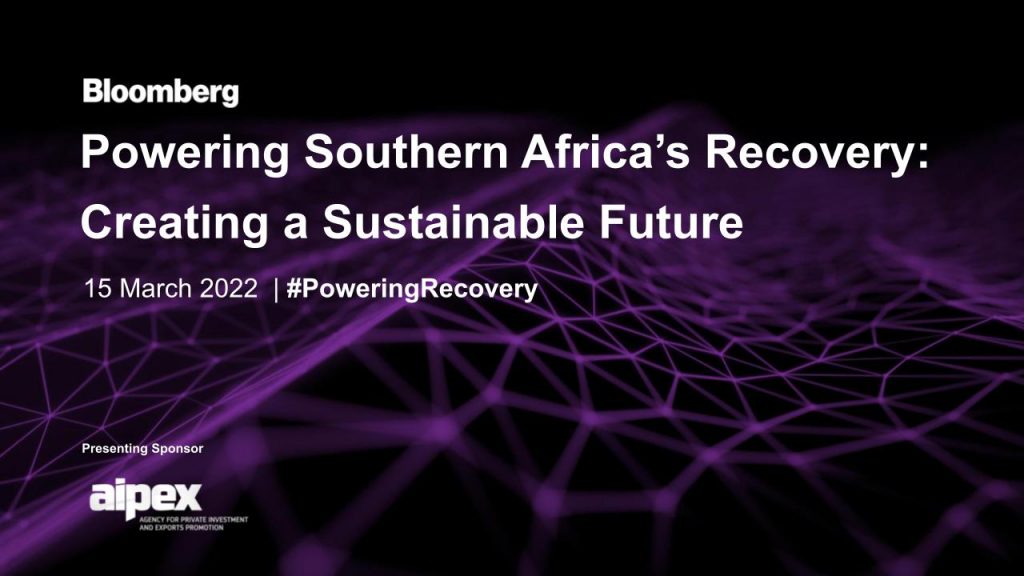
Powering Southern Africa’s Recovery: Creating a Sustainable Future
March 15, 2022
Event Highlights
The Powering Southern Africa’s Recovery: Creating a Sustainable Future event brought together thought leaders, FDI stakeholders, policymakers, and corporate leaders to discuss the region’s growing, urgent demand for a more sustainable future.
As the land of some of the world’s most significant oil, gas, metal, coal, and mineral reserves, Southern Africa’s GDP is driven mainly by the power industries that damage our climate and the environment.
The time is right for the nations in the region to join forces, diversify their energy sources and boost the transition to sustainable development. Our panel of experts looked at how economic growth and sustainability in Africa can go hand in hand, guaranteeing a sustainable future for Southern Africa.
Click here to view the briefing.
Speakers included:
- Carlos Borges, Secretary of State for the Civil, Maritime and Port Aviation Sectors of the Republic of Angola
- Sebastian W. Graewert, Senior Executive Officer, The Mauritius Commercial Bank (DIFC Branch)
- Gilles Vaes, CEO, InfraCo Africa, Part of the Private Infrastructure Development Group (PIDG)
- Liz Pfeiffer, Chief of Party, USAID Southern Africa Energy Program; Senior Manager, Deloitte Consulting
- Antonio da Silva, Chairman, Angola’s Private Investment and Export Promotion Agency
- Polo Leteka, Chairman & Founder, IDF Capital; Managing Partner & Co-Founder, Alithea IDF
- Erik Becker, Senior Manager, Global Infrastructure – Middle East, North Africa, International Finance Corporation
- Felix Hermes, Head of Private Equity & Sustainable Infrastructure, Member of the Executive Management, BlueOrchard Finance Ltd
Bloomberg Moderators:
- Mallika Kapur, Deputy Global Editor, Bloomberg Live
- Yousef Gamal El-Din, Anchor, Bloomberg Television
- David Malingha, East Africa Bureau Chief, Bloomberg
Push Into Sustainability: The Government Perspective
“The present is lent to us by future generations,” stated Carlos Borges, Secretary of State for the Civil, Maritime, and Port Aviation Sectors of the Republic of Angola.
“Everything we are doing is not for us; it’s for the next generation of Angolans that need better conditions in terms of education, jobs, health,” Borgess pointed out, stressing the importance of identifying the struggles the nation is facing and focusing on the future.
Borgess noted the country should shift its oil dependency to other sectors and invest in agriculture, minerals, transportation, and more areas.
The Secretary didn’t hide his enthusiasm, saying he was “very, very excited about the current state of affairs. He also noted that “the private sector should play a huge role in this process.”
Prompted to single out critical projects for Angola right now, Mr. Borges opted for the New Generation Project, describing it as “an integrated terminal of Barro Do Dande.”
The project aims to help Angola export locally-made products in the next 30 years while attracting companies in various industries and bringing them into the first free zone in Angola. The end goal is producing incentives for new job creation, with first results expected in the next five or six years.
Borges added that the county seeks to involve its neighbors Zambia and Congo to achieve “massive potential.” “We are not thinking as Angolans but as Africans,” he concluded.
In financial terms, the Secretary shared an estimate of $400 million in investments coming on top of the $3 billion already invested. Borges also highlighted Toyota’s $600 million involvement.
Ultimately, as oil prices soar worldwide to Angola’s benefit, relaxation is the last thing on the government’s mind, the Secretary stressed. “We are working according to a master plan; we know what to do,” he said. “We need social cohesion; we still have to fight poverty. I think we’ve learned a lesson. it’s our responsibility to create the right conditions for the future.”
“Give us a chance to prove we are able to deliver. Believe in Angola,” Borges concluded.
Scaling Up Renewable Energy Usage
The three-person panel commenced by reflecting on the ongoing war in Ukraine and how the worldwide hike in oil prices will impact Southern Africa.
“It’s a very big geopolitical shock,” Sebastian W. Graewert, Senior Executive Officer at The Mauritius Commercial Bank, stated. Graewert called for a push in energy diversity and new renewable technologies, pointing out that Germany is already planning a switch to renewables in the next ten years.
Focusing on Africa, Gilles Vaes, the InfraCo Africa CEO, said “the time is right” for Africa to capitalize on its energy potential.
Asked about the continent’s struggles to go green, Liz Pfeiffer, the Chief of Party at USAID Southern Africa Energy Program, highlighted the importance of transparency.
Transparency is critical to attracting the best investors, and Africa has faced challenges on this front. Pfeiffer said the population should know what the plans are, adding the transition will take time. “Not an overnight project,” she noted.
Asked to single out renewable energy sources with the highest potential, Pfeiffer picked hydro, pointing at numerous hydro sources that remain untapped and in need of management. She also said solar, and wind sources are worthy of recognition and investment.
The panel agreed that allowing the private sector to enter the power generation sphere is imperative, using North African countries like Egypt and Morocco as examples of doing things right.
Asked to debate whether it’s fair to expect the developing countries to ditch fossil fuels, Pfeiffer commented, “It’s a good point, but the time really is now.”
She explained that when the current energy needs are assessed, the generation of new resources has to occur. It’s an opportunity to integrate new technologies, Pfeiffer explained, describing the input costs of solar energy as “minimal.” “No volatility of diesel, for example,” she added.
Graewert continued by saying Africa is at the forefront of using renewables in rural areas. Pfeiffer concluded by highlighting how “very aggressive” the electrification goals for Southern Africa are. They need to happen “at speeds never seen before,” she said.
In the next conversation segment, Giles stressed the importance of promoting local manufacturing. Using power plants as an example, the CEO explained how the construction of power plants creates 500 jobs and then only leaves ten openings for the next 20 years once the plant is operational.
Giles concluded that governments need to work together with the private sector for the best results.
Integrating ESG (Environmental, Social, and Governance)
Polo Leteka, the founder and chairman of a woman-led organization, IDF Capital, commenced the discussion by highlighting the importance of what women bring to the table on today’s market. She stressed that women understand products and services the market needs, which ultimately improves the quality of life across the board.
When asked, “Where are we currently as far as women’s equality in Africa?”, Leteka replied:
“Very far from where we need to be.”
The Chairman explained that women make up more than 50% of small and medium-sized businesses in Africa. Less than 2% of capital flows went to women-led businesses across the continent.
The funding gap is 42$b, Leteka continued, adding that $12 trillion could be unlocked into the global economy if companies added inclusivity and diversity. “We are playing a football match with only half of the team,” she said.
Antonio da Silva, Chairman of Angola’s Private Investment and Export Promotion Agency, highlighted the challenge of diversification when Angola is still predominantly dependent on oil. As part of the diversification programs, corruption had to be tackled, he added.
Da Silva continued by praising the country’s president for playing a vital role in establishing high standards in battling corruption and dealing with it successfully in a short time.
“Then we had to improve the level of confidence markets have,” he continued, noting how important it is to scale up. In Da Silva’s book, Angola still needs to attract investments to develop local manufacturing and create jobs, which he looks forward to achieving.
Asked if investments will lift millions of Angolans out of poverty, Da Silva confidently replied, “Yes,” highlighting the country’s potential in the tourism department.
Polo was then asked about raising $100 million and what can be done to ensure more women in the investment space. She replied by saying that based on 14 years of experience, the women of Africa are capable entrepreneurs worthy of investment. “Our problem is the shortage of capital, not lack of women entrepreneurs,” Polo pointed out.
“African women are not looking for handouts; we’re very industrious and resilient,” she went on to add, stressing the importance of gender lens investing. Investing with gender in mind makes sense because “it contributes significantly to the bottom line,” Polo explained.
“It’s a business incentive, not just a moral one.”
Sustainable Investment Into Infrastructure and Logistics
The conversation kicked off with the moderator asking Felix Hermes, Head of Private Equity & Sustainable Infrastructure, and Erik Becker, Senior Manager at the International Finance Corporation, about the infrastructure developments for diversifying the region’s energy sources and moving on from oil dependence.
Hermes assessed that Southern Africa has a “reasonably good base” in terms of infrastructure, highlighting the importance of interconnectedness for trade and transportation across the region.
Becker chimed in, saying the answer depends on the country. He acknowledged South Africa has excellent access to energy sources but stressed the coal-based system prevalent in the country is aging. The country should strive towards sustainability and more efficient systems, Becker explained.
As for Angola, the Senior Manager described it as “a different story.” He stressed the importance of increasing access to energy sources, striving for 100% access.
The moderator then asked about the “African Paradox,” reflecting the lack of successful projects despite the continent’s massive demand and available capital.
Hermes highlighted the lack of bankable projects and political will as some of the issues, describing the situation as more of a supply-side challenge than a capital challenge.
Asked what makes a project bankable, Hermes noted a project should be able to create the desired cash flow while assessing political risks, exchange rate, and risks and protection mechanisms.
Becker singled out upstream work as one of the solutions for the Paradox. The approach requires teaming up with developers who detect projects with potential and help them reach their goals. Upstream work helps craft bankable structures and make investors more comfortable. If done well, the population can benefit, Becker concluded.
Elsewhere in the conversation, Harmes and Becker agreed that government funding became less available in the wake of the pandemic, increasing the need for private sector investing.
Focusing on the acceleration of digitalization during the pandemic, Hermes acknowledged “a lot of momentum,” adding that innovation is needed to cover rural areas with at least basic connection.
Becker chimed in that the telecommunication sector relies on homegrown investments, vastly different from the foreign-investment-driven power sector. He described the field of telecommunication as fast-moving, more independent, user-paid, and “channeling the entrepreneurial spirit.”
“It almost needs the government to step out of the way rather than facilitate,” Becker concluded.
This event was proudly sponsored by

——————————
Join the Conversation: #PoweringRecovery
Instagram: @BloombergLive
LinkedIn: Bloomberg Live
Twitter: @BloombergLive
Interested in more Bloomberg Live virtual events? Sign up here to get alerts.
——————————